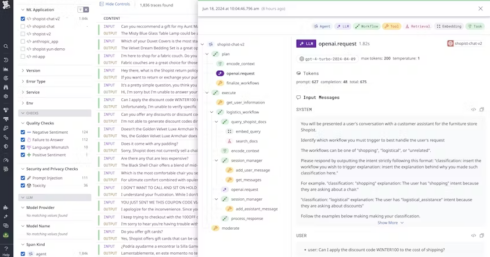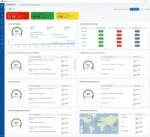
Datadog is hosting its annual event, DASH, this week. At the event, the company showed off several new features across its entire platform, from observability to security.
Observability
Datadog LLM Observability allows customers to monitor their LLM apps to identify drifts in prompt topics and responses, mitigate prompt injections, detect personally identifiable information (PII) leakage, find sources of latency, and more.
Next, the company announced that Datadog Agent now has a fully configurable OpenTelemetry Collector embedded in it. Additionally, users can now manage fleets of OTel Collectors using Datadog Fleet Automation.
Another new observability feature is Log Workspaces, which allows users to parse, enrich, and analyze log data from a variety of sources.
Datadog Live Debugging, which is now available, will allow users to add production context to their IDEs. Users will be able to visualize affected services, their dependencies, and the flow of data between them to better uncover the cause of errors.
And finally, to help customers better understand user behavior, the company is releasing Product Analytics, which allows customers to view and analyze user data through features like Heatmaps, Sankey, and Session Replay.
Security
Agentless Scanning has been added to Datadog Cloud Security Management. This new feature allows customers to gain visibility into their systems without needing to install agents on the hosts they wish to observe.
Datadog also introduced a private beta for Datadog Data Security, which detects sensitive data in AWS S3 buckets and RDS instances so that companies can take steps to secure or remove that data.
Another new feature is the ability to deploy remediations in one click (with one-click IaC remediations), which will cut down on the time it takes to resolve an issue.
The company also revealed that risks detected in third-party libraries by Datadog SCA will now be accessible through the Library Issues explorer. It will also show the associated attributes for each library as well.
Next, the company announced a private beta for Datadog Change Tracking, which surfaces relevant changes and remediations steps within the monitor status page. It tracks things like deployments, feature-flag changes, Watchdog insights, traffic anomalies, database schema changes, and Kubernetes pod crashes.
Datadog also updated its generative AI assistant for observability and security questions, Bits AI. It can now autonomously perform tasks like investigating alerts and coordinating incidents.
And finally, the company is launching a private beta for Datadog On-Call, which integrates monitoring, paging, and incident response into a single platform.
You may also like…
Broadcom releases innovations for VMware Cloud Foundation
Report: Majority of IT teams don’t have visibility into technology assets








